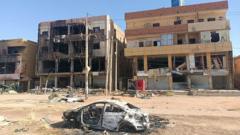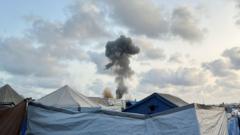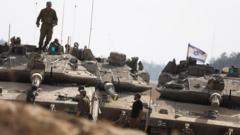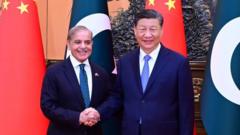As calls for a ceasefire intensify, diplomatic tensions rise with potential repercussions for Israel's international relationships.
**International Outcry Intensifies as UK, France, and Canada Urge Israel to Halt Gaza Offensive**

**International Outcry Intensifies as UK, France, and Canada Urge Israel to Halt Gaza Offensive**
International leaders grow increasingly frustrated with Israel's military actions in Gaza amid escalating humanitarian crises.
In a significant escalation of international criticism, the governments of the United Kingdom, France, and Canada have jointly demanded that Israel cease its military operations in the Gaza Strip. Following a resurgence of violence after the breakdown of a ceasefire in March, thousands of lives have been lost, intensifying scrutiny of Israel's aggressive military strategy since the Hamas attacks on October 7, 2023. Israel's actions, supported largely by United States weaponry, have drawn ire from these traditionally allied nations, who have expressed profound concern over the humanitarian catastrophe unfolding in Gaza.
In a strong statement, the three nations articulated their opposition to Israel's military expansion, categorizing the suffering of Gazans as "intolerable." They urged for a ceasefire and emphasized the need for the release of remaining hostages taken during the October attacks. "We believed Israel had the right to defend itself, but this escalation is disproportionate," the statement read, contradicting Prime Minister Netanyahu's narrative that his military efforts are a necessary push against Hamas.
Netanyahu, in turn, dismissed the criticisms as misguided, arguing that his approach is vital to Israel's national security, suggesting that cessation of hostilities would require Hamas to relinquish hostages and agree to full demilitarization. Amidst this backdrop of diplomatic relations strained by humanitarian concerns, Netanyahu faced immense pressure from multiple fronts. The United Nations characterized the aid flow to Gaza as a pittance compared to the region's urgent needs, revealing that only five trucks of aid entered on a recent day when Israeli military operations ramped up.
The recent deaths of emergency medical staff during Israeli air strikes have ignited global calls for accountability, with protests across the globe urging intervention. France's President Macron has spearheaded these calls, framing them as vital to uphold international law and human rights.
European leaders appear to be losing patience with Israel's actions and have signaled readiness to impose concrete measures if aggressive military actions continue unmitigated. Potential consequences may include sanctions or even diplomatic recognition of Palestine as a state, which could shift the balance of power in an already volatile situation.
As dissent against Israeli policies grows, the dire humanitarian situation in Gaza complicates the geopolitical landscape, with international allies calling for immediate action and intervention to avert further disaster.
In a strong statement, the three nations articulated their opposition to Israel's military expansion, categorizing the suffering of Gazans as "intolerable." They urged for a ceasefire and emphasized the need for the release of remaining hostages taken during the October attacks. "We believed Israel had the right to defend itself, but this escalation is disproportionate," the statement read, contradicting Prime Minister Netanyahu's narrative that his military efforts are a necessary push against Hamas.
Netanyahu, in turn, dismissed the criticisms as misguided, arguing that his approach is vital to Israel's national security, suggesting that cessation of hostilities would require Hamas to relinquish hostages and agree to full demilitarization. Amidst this backdrop of diplomatic relations strained by humanitarian concerns, Netanyahu faced immense pressure from multiple fronts. The United Nations characterized the aid flow to Gaza as a pittance compared to the region's urgent needs, revealing that only five trucks of aid entered on a recent day when Israeli military operations ramped up.
The recent deaths of emergency medical staff during Israeli air strikes have ignited global calls for accountability, with protests across the globe urging intervention. France's President Macron has spearheaded these calls, framing them as vital to uphold international law and human rights.
European leaders appear to be losing patience with Israel's actions and have signaled readiness to impose concrete measures if aggressive military actions continue unmitigated. Potential consequences may include sanctions or even diplomatic recognition of Palestine as a state, which could shift the balance of power in an already volatile situation.
As dissent against Israeli policies grows, the dire humanitarian situation in Gaza complicates the geopolitical landscape, with international allies calling for immediate action and intervention to avert further disaster.




















